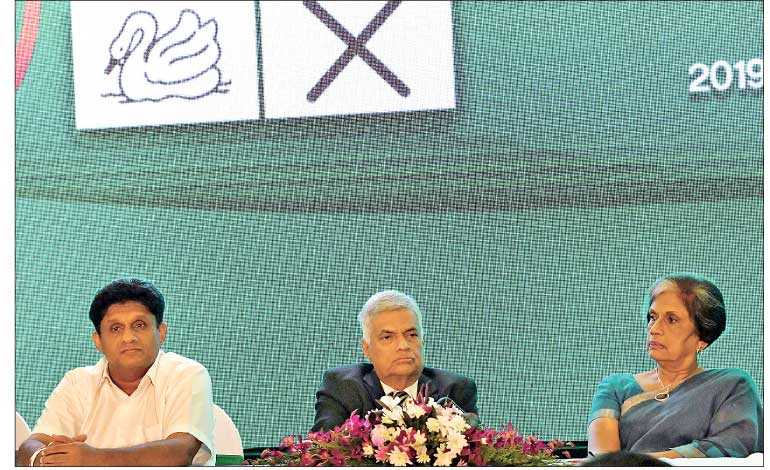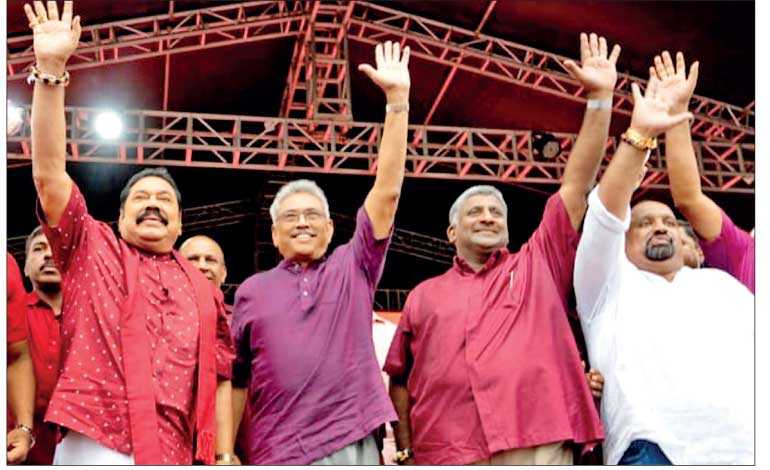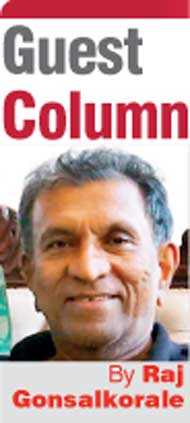Friday Feb 20, 2026
Friday Feb 20, 2026
Wednesday, 6 November 2019 00:00 - - {{hitsCtrl.values.hits}}

It is difficult to see how candidate Premadasa, who does not seem to have been able to demonstrate any evidence of potential new blood before the election, will be able to bring in any new blood of any significance after the election, should he win the presidency

The politician in the Pohottuwa duo is Mahinda, and not Gotabaya. It is likely that the politician Mahinda will bring in the old hands to a Gotabaya administration, while Gotabaya the non-politician will bring in some professionals and academics to his administration
“It’s the economy, stupid” is a slight variation of the phrase “The economy, stupid”, which James Carville coined as a campaign strategist of Bill Clinton’s successful 1992 presidential campaign against president George H. W. Bush. Carville’s original phrase was meant for the internal audience of Clinton’s campaign workers as one of the three messages to focus on, the other two messages being “Change vs. more of the same” and “Don’t forget healthcare”.
Voters are probably digesting the avalanche of promises made by the candidates, in particular the two leading candidates as well as the somewhat, a distance away candidate, Anura Kumara Dissanayake.
While most promises are liable to increase the debit side of the ledger if the promises are implemented, there are no specifics as regards to how much the promises will cost and where the money will come to fund the promises.
 The Bill Clinton slogan, “It’s the economy, stupid” clearly portrays who the voters are, stupid, if they believe everything that has been promised, and no doubt will continue to be promised till the night of 15 November.
The Bill Clinton slogan, “It’s the economy, stupid” clearly portrays who the voters are, stupid, if they believe everything that has been promised, and no doubt will continue to be promised till the night of 15 November.
However, having being bitten on many previous occasions, the candidates maybe in for a surprise if they continue their promise fest without being realistic and responsible in identifying the fundamental needs of a very substantial segment of the population of the country which is non-urban based and who are in the main, daily wage earners, small to medium business owners, and others who are employed by the public and private sector at lower levels in the organisation structures who earn little but who have very significant expenditure commitments for them and their families.
They may well remember that the Sri Lankan voters might have been fooled some of the time, but that they will not be fooled all the time. From a broad perspective they are likely to make up their minds on the candidate and the team that will give them the confidence that the country will be secure from terrorism, from foreign interference, from drug dealers and criminals, all of which contribute to the insecurity of the country, that there will be an economic policy that provides direction and certainty for them and their families so that they will all be able to earn a living wage or income, and the leadership to make the country an inclusive and peaceful home where everyone could live without fear and in harmony with fellow human beings and with nature.
No doubt a government is responsible for spurring the engine of growth and opportunity in the country and setting the direction for the economy and its areas of focus. Sri Lanka is saddled with a huge foreign debt, irrespective of who is responsible for that debt. If this is not managed well, the consequence will be a failed state which could also be referred to as a banana republic.
An industrial base that exports, will earn money for the country and import substitution will save money for the country by reducing imports. The trade deficit automatically narrows, and the country will have more funds to invest in education, health, social welfare and other key areas in the compulsory social compact with the people of the country. Does this sound too simplistic? Maybe it does, but is it not a logical statement?
Neither major candidates for the presidency has outlined a policy of this nature. While foreign investment in key areas such as in the knowledge management sector are very important, they too naturally should be identifiable within the two facets mentioned. While self-sufficiency in every sphere of the economy will not be possible, and may even not be desired as quality improvements of local products or services can happen only if there is competition with quality goods or services from overseas. However, where possible and feasible, industry policy should provide guidance in the form of frameworks, identifying which substitution industries will receive assistance from the government for defined periods of time.
The banks can and should play a major role in spurring the economy and perhaps have lower super profit expectations and greater investment promotion as the return on such investments would naturally lift the economic platform, and in turn the profitability of banks.
The writer is personally aware of a small scale industrialist who has designed and produced an agricultural machine that can performs three tasks at the same time, all automated and programmable. This machine is far superior to a Chinese made machine that is available in the market which can only perform one task at a time. This industrialist has been pushed from pillar to post and has not been able to access initial seed funding to manufacture this machine from the relevant government agency. The interest charged by banks is far too prohibitive for financing his enterprise and now he is contemplating closing down his business. This machine has very significant potential for the local market and even more for the export market as developed countries with vast tracks of land devoted to agriculture would welcome a machine of this type sold at a competitive price.
There is no doubt there are many similar industrialists who have given up as there is no policy setting to promote this kind of import substitution, and no agency which can support such industrialist in an efficient and effective manner without hiding behind the AR and FR of the government.
Political stability, renewal and economic growth
The anti-Rajapaksa forces are assembling the same forces that ousted Mahinda Rajapaksa in 2015, while candidate Premadasa talks about bringing in new blood to his cabinet should he win the election. The two acts in this drama are disconnected and disjointed as Prime Minister Wickremesinghe has announced he will continue as the PM, while Premadasa hints that there might be a change.
It appears that if one votes for Premadasa, you will actually get Wickremesinghe and the old guard of the UNP. It is difficult to see how candidate Premadasa who does not seem to have been able to demonstrate any evidence of potential new blood before the election, will be able to bring in any new blood of any significance after the election, should he win the presidency.
Talk is cheap and easy. It is more than likely that Premadasa will have to accept the reality that he will have very little authority within his own party, and he will have to work with the Party Leader and the entirety of the old guard. If he does not, the resulting infighting will create instability within a Premadasa government and the country. Voters of course has the ultimate choice, and decide whether they wish to have the old guard back in power
Given this situation, and the fact that the presidency has been watered down by the 19th Amendment, it appears that the strategy of the old guard of the UNP is to look beyond the Presidential Election and to the next general election and to form a UNP-led government with Wickremesinghe as the Prime Minister.
As is common knowledge, Gotabaya Rajapaksa is backed by his Viyath Maga team and several other professionals and academics besides the old hands still in his coalition. It is very likely the former will play a significant role in a Gotabaya Rajapaksa administration should be win the presidency. The politician in the Pohottuwa duo is Mahinda Rajapaksa, and not the candidate Gotabaya. It is likely that the politician Mahinda will bring in the old hands to a Gotabaya Rajapaksa administration, while Gotabaya the non-politician will bring in some professionals and academics to his administration.
Whoever wins, the country needs political stability as instability due to infighting will provide opportunities for breaches of security, as was witnessed with the Easter bombings, consequent negative impact on the economy, again, as witnessed with the Easter bombings, and a society suspicious of each other and living in fear, as was witnessed with the Easter bombings.
If indeed, Gotabaya is to win, any independent and objective observer may say that there will be a greater chance of political stability with him and the former President at the helm. Of course, this stability could be affected by the ambition and objectives of the current President who appears to have his own agenda which may not be in sync with the agenda of the new president and the new prime minister. After all, he was once the Judas to Mahinda Rajapaksa.
Besides this key issue, one which is causing concern for voters when it comes to a Rajapaksa return to power, is the fear that is there, justly or unjustly, about their authoritarian tendencies and alleged human rights violations. They must know that perceptions at times are as dangerous as reality when it comes to their quest for power. Gotabaya and Mahinda Rajapaksa and their team should do something to allay these fears, and assurances will not be sufficient to allay such fears.
An independent and powerful ombudsman entity to investigate unlawful activities
Perhaps an independent and powerful ombudsman entity that could investigate any future accusations on human rights violations and unlawful activities and submit their findings to the Supreme Court for prosecution, could be considered in addition to other measures that may be under consideration. Such an entity would benefit the general public whoever who wins this election and any future elections.
On economic matters, promises are galore, and even if a fraction of what is promised is delivered, Sri Lanka could easily move up the ladder of per capita income. Historically, and to the present day, Sri Lanka has never had an accountability system to hold leaders responsible for the promises they make during elections.
One can recall with some amusement how Sirimavo Bandaranaike promised to bring rice even from the moon during the election campaign of 1970!
On a more serious note, an unaccountable manifesto that is not budgeted, can only give a very general policy overview with no guarantee of even a single promise being delivered once in office.
One has to say here though that the one policy manifesto in recent times that had a monitoring body to monitor and report on progress was the Mahinda Chinthana policy document.
Both candidates owe it to the voters to firstly, give some indication how much their promises may cost and how they intend finding the funds to pay for them. Secondly, the mechanism, they will have in place to monitor progress of their manifestos. This mechanism should be accessible to the public. The app that Gotabaya Rajapaksa released for the public to view his manifesto online is a welcome and novel development. This could be expanded to display the progress on actual implementation of his policies and programs.
Several industrialists who are engaged with export and import substitution industries have written and spoken about the challenges faced by them in the economic circumstances the country has been in for the last few years. They claim that the proposal made by former CB Governor Nivard Cabraal should go some way to assist industrialists who are facing lending issues.
Cabraal said: “We need the private sector to think of projects. The Government cannot and shouldn’t do it. For businesses to do it, we will help. We will take businesses out of the mess they are in. Thousands of entrepreneurs and businesses are in difficulty today,” he added.
As a solution, Cabraal said CRIB will be reformed and restructured in a way those who have shown good results in the past but had difficulties in repaying loans due to the downturn in the economy are given protection. “They will be given some leeway to resume business,” he said, adding they will be given an 18-month moratorium as far as repayment of capital of the loan but encourage to pay interests.
The former Central Bank Chief also said SLPP will make sure interest rates come down as in the current level people can’t do business. He said in 2014, the Average Weighted Prime Lending Rate (AWPLR) was 6.2%. Today it is 12%.
Cabral said banks were now busy giving targets to file action on defaulters as opposed to goals on loans and deposits. “We are experiencing something new,” he added.
Some industrialists opine that Cabral’s offer has limited benefits as it is directed towards those who are in debt to a bank, which of course s beneficial to the borrower, but doesn’t necessarily help those who are not in debt as such but are struggling to make their businesses profitable. This they contend is due to the lowering of credit facilities by banks who also operate under uncertain conditions, both on account of the world economic situation and also the local situation. While the export industry may benefit when the exchange rate depreciates, as it has, with the rupee falling to Rs. 180 to the USD from Rs. 130 in 2015, the lack of bank assistance with the lowering of credit facilities, and high interest rates, high labour costs, as well as the high cost of electricity and infrastructure costs, have all contributed to export based industrialists having great difficulties in keeping their businesses afloat.
Some industrialists have stated that an incentive like a FEECS scheme Dr. N.M. Perera implemented in the seventies, extended to exporters where a FEECS certificate could be cashed at say at Rs. 10-15 above the official exchange rate, could assist exporters and also attract more foreign exchange to the country.
Another management consultant commented: “The money required to fund the promises made by the contenders could potentially increase the country’s foreign debt which now accounts for almost 50% of all debt and with the rupee depreciation, the total debt in LKR has gone up significantly. Since the economic situation has been deteriorating steadily, the national debt ratings have also gone down and the country has to pay higher interest on all our bonds. The last 10 year USD Sovereign bond that SL floated was at 7.85%, paying more than we paid in previous years. The small and medium scale industrialists have paid heavily because of the deterioration of the economy. Also the plantation sector is now almost dead, as labour rates have swelled with no corresponding price increases for tea and rubber and wages not being linked to productivity. So these industries are in great trouble, but no one is even talking about it. Lowering interest rates by a few points is of little help. Another foolish thing they did was to allow car permits that drained the little foreign exchange we had. Result was a weaker LKR. Of course, both these actions were winners for the politicians.”
This comment would no doubt confirm the views of many industrialists that the country’s economy is badly sick, and no one has been able to find the medicine to treat this sickness. When politicians act as doctors, in this case, economic doctors, the result is a worsening of the sickness. This is what has happened.
Whoever who wins must give priority to an export based and import substitution economy. Banks could lower interest rates and support industrialists who are engaged in industries in such an economy. The tea, rubber and coconut industries should be productivity based and wages must be linked to productivity.
There are other measures that could save foreign exchange for the country. For example, the luxury life enjoyed by politicians could be curtailed beginning with a limitation of the number of cars available to each politician to one car, and the CIF value for any car to be imported for a politician limited to $ 25,000. Car permits being issued to all others should be ceased for three years and an independent study done on the policy and methodology for issuing permits.
The country would also save huge amounts of money if waste and corruption is eliminated. As a start, the assets and liabilities of all politicians and senior public officials could be ascertained and made public, and all politicians and public officials compelled to submit audited statements to the public on an annual basis. Motherhood statements about curbing waste and corruption is not good enough. More tangible, accountable measures are needed if the public is to have confidence that politicians are not lying through their teeth as usual just to get their vote.
Voters now a have a chance to see who will be able to make ends meet and who will be able to find the medicine to cure the economic illness the country is badly afflicted with. There are only two serious choices, which itself is a great pity.
However, given this situation, the voters could be stupid and believe the fairy tales they are being told or they could be cleverer than the politicians and demand the truth and what measures they will introduce to usher in the necessary steps to revive the sick economy and the country.
Pix by Shehan Gunasekara